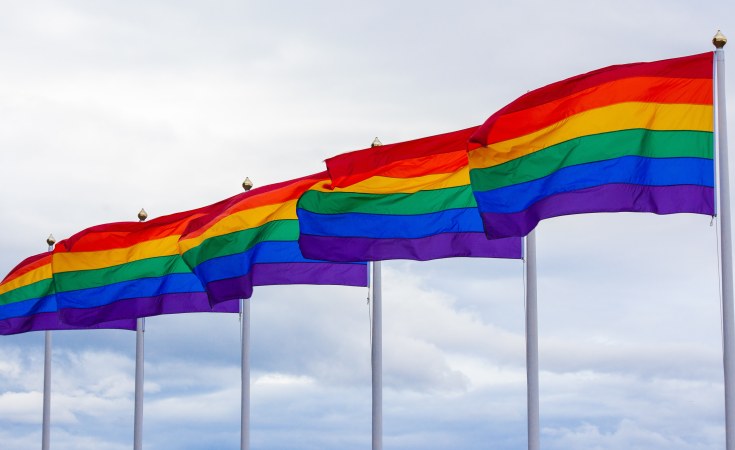The protests have taken place in Kenya after the supreme courts affirmed the rights of LGBTQ persons to register their association. Demonstrators have accused judges of being lenient with the LGBTQ+ community.
The LGBTQ+ community in Kenya is fighting back against recent anti-gay protests pushing for the curtailment of their rights as they seek recognition and acceptance.
Recently, anti-gay protests have taken place following a court ruling last month by Kenya's Supreme Court to reaffirm the LGBTQ+ community's right of association.
Kenya's laws, though, outlaw same-sex relationships, but the court reaffirmed an earlier ruling that the Non-Governmental Organization Board in Kenya discriminated against LGBTQ+ people when it refused to register their association.
Anti-gay protesters have since taken to the streets to call for the removal of judges they deem to have relaxed specific laws on LGBTQ+ rights.
Mohammed Ali, a Kenyan lawmaker who was one of the organizers of the anti-gay protests, told DW that there should be no room for LGBTQ+ activities and associated rights in Kenya.
"We do also call upon the head of state, his Excellency President William Ruto, to come out strongly against LGBTQ machination," Ali said.
LGBTQ+ community fights back
Following the Supreme Court ruling, the LGBTQ+ community is pushing back even harder on these latest agitations, demanding that their rights be protected.
A member of the community, who preferred to be called Samuel, told DW that recognizing the rights of gays and fighting against discrimination has become even more critical following recent anti-gay protests.
"At the moment, I have gone through a lot. I have gone through stigmatization, I have gone through discrimination and now why do you want me to turn from being gay? If you want to kill me, kill me," he said.
Derick, another person who identifies as gay, said all the community is calling for is to be left alone to co-exist with others.
"We can coexist peacefully, right now as we are right now, we are coexisting, so you need to look at this not from the basis of the sexual orientation because apart from the sexual orientation, there is the human being part of it," Derick told DW.
"We do pay taxes as you do, we do literally everything that every straight person does, so in terms of correlation it can work very well."
Surviving homophobia
The LGBTQ+ community in Kenya has also faced homophobic attacks, with some being subjected to physical abuse sometimes.
"Homophobia has always been prevalent, but abuse is based on silence. What queer people cry for all the time that now we are confident enough to say is that we have been here since time immemorial," Marylize Biubwa, co-founder of the queer republic in Kenya, told DW.
She said those who carry out homophobic attacks have been encouraged by a system that fails to punish perpetrators.
"We have been abused and the system in place allows perpetrators of homophobia to find the power to abuse us by making as keep quiet and not say anything," Biubwa added.
When the Supreme Court gave its ruling recently, Kenyan President William Ruto said he respected the court's decision but also noted that the country's culture and religion don't allow same-sex relationships.
Kariuki Ngunjiri, the youth leader of the ruling UDA party in Kenya, told DW that the government intends to tackle homophobic attacks against LGBTQ+ people.
Ngunjiri also added that there is a lot of pushback because of the heightened activism for same-sex relationships in Kenya.
"It is now turning out to be activism," Ngunjiri said as he signaled many Kenyans would prefer [LGBTQ+] activists would tone down.
"We would rather live the way we used to live those days where no one talked about these things."
Seeking refuge via social media
Since the anti-gay protests emerged, members of Kenya's LGBTQ+ community have resorted to social media to share their stories, raise awareness, and build support networks.
They are amplifying their voices in their pursuit of equality and constitutional recognition.
Kenyans, though, are divided over the concerns of the LGBTQ+ community and its push for equal treatment.
"Personally, I think anything that does not interfere with me is just ok, so they are living their lives, why should I interfere," a female Nairobi resident told DW.
Another resident from the capital told DW that she has "nothing against LGBTQ. I think everybody has the right to make their own choices."
But there are other Kenyans who aren't friendly towards the community.
"I don't tolerate such, I am open to criticism but that is my stand," one male resident told DW.
This year, Kenya's neighbor, Uganda, enacted an anti-LGBTQ+ law that carries the death penalty for charges of aggravated homosexuality.
The law is considered one of the harshest in the world and Kenyan lawmakers want to follow suit.
Kenyan lawmaker Peter Kaluma has submitted a similar harsh law in Kenya's parliament that is currently pending a review before a potential debate.
Edited by: Chrispin Mwakideu


